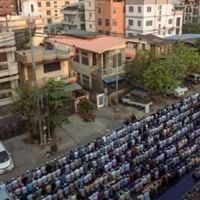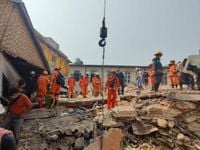Mandalay, Myanmar, March 31 (ANI): Indian rescue teams have been actively engaged in relief efforts following a devastating earthquake that struck Myanmar on March 28, 2025. The earthquake, which registered a magnitude of 7.7, has resulted in catastrophic damage and a reported death toll exceeding 1,600, with thousands more injured.
The Indian Embassy in Myanmar announced on Sunday that teams were deployed under "Operation Brahma" to provide critical support for survivors. In a post on X, the embassy stated, "Operation Brahma- Since arriving at earthquake sites in Mandalay yesterday, our teams are working to extend critical support in search for survivors and medical/HADR support. More aid is on the way. Our hearts and prayers are with the affected people of Myanmar." This commitment highlights India's swift response to the humanitarian crisis.
Prime Minister Narendra Modi emphasized the significance of this operation, linking it to India's foreign policy philosophy of "Vasudhaiva Kutumbakam," which translates to "the world is one family." He remarked, "Our mantra of 'Vasudhaiva Kutumbakam' is reaching the entire world... Myanmar was hit by a tragic earthquake a day before yesterday; India was the first to reach there and launched Operation Brahma. India does not take time to extend help." This sentiment reflects India's proactive stance in international disaster response.
The earthquake has not only affected Mandalay but has also been felt across the region, prompting Myanmar to issue a call for international aid. Following the disaster, powerful aftershocks have hampered rescue operations, complicating efforts to locate those still missing.
India's National Disaster Response Force (NDRF) has commenced rescue operations at the U hla thein monastery, where approximately 170 monks are trapped. The Ministry of External Affairs (MEA) confirmed that an Army team will assess the hospital site on March 31, 2025, with plans to establish medical services by April 1, 2025. Additionally, the NDRF is working to deploy units to the Sky Villa, where four 11-story towers collapsed, leaving many trapped, including foreign nationals.
Relief materials are also on their way to the Secretary General of the state Mahanayak Committee, where around 2,000 monks are currently without shelter or basic amenities. While the monks are unharmed, they face significant challenges in accessing necessities.
In a broader regional response, Malaysian Prime Minister Datuk Seri Anwar Ibrahim has reached out to Myanmar's Senior General Min Aung Hlaing to express condolences and offer support. As the Chair of ASEAN in 2025, Malaysia has committed to assisting Myanmar during this crisis. Anwar stated, "Malaysia and ASEAN will continue to support humanitarian aid efforts that are actively underway, including through the Special Malaysia Disaster Assistance and Rescue Team (SMART) that has been deployed to Myanmar early today to join in the search and rescue operations in the worst-hit areas."
Malaysia's involvement includes sending two Royal Malaysian Airforce (RMAF) aircraft to Naypyidaw, carrying 50 SMART personnel along with essential equipment to aid in the search and rescue operations. Anwar also mentioned that a humanitarian mission, led by Foreign Minister Datuk Seri Mohamad Hasan, is scheduled to depart for Myanmar soon.
During a Special Emergency ASEAN Foreign Ministers’ Meeting organized by Malaysia, discussions focused on mobilizing support for Myanmar. Anwar also contacted his Thai counterpart, Paetongtarn Shinawatra, to convey condolences and address matters concerning ASEAN's ongoing commitment to facilitate a peaceful resolution to Myanmar's ongoing crisis.
The earthquake has inflicted severe damage not only in Myanmar but also in neighboring Thailand. A 33-story skyscraper under construction in Bangkok collapsed due to the earthquake, prompting an investigation by the Thai government. Deputy Prime Minister Anutin Charnvirakul visited the site of the collapse and called for an immediate inquiry into the construction practices of the firm involved, which is in a joint venture with a Chinese company.
This incident has raised concerns about building safety standards and regulatory oversight in the region. With the earthquake's impact resonating across borders, the need for robust disaster preparedness and response mechanisms is more critical than ever.
As the situation unfolds, the international community's response will be crucial in aiding the recovery efforts in Myanmar and addressing the humanitarian needs of those affected. The commitment from India and Malaysia exemplifies a collaborative approach in times of crisis, highlighting the importance of solidarity in the face of natural disasters.
The aftermath of the earthquake serves as a stark reminder of the vulnerabilities faced by nations in disaster-prone regions. As rescue operations continue and aid flows in, the resilience of the affected communities will be tested, and the global response will play a pivotal role in their recovery journey.






